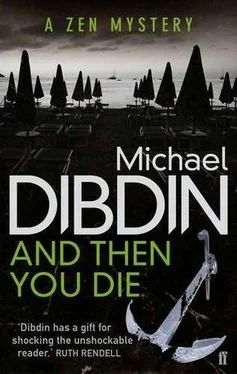Michael Dibdin - And then you die
Здесь есть возможность читать онлайн «Michael Dibdin - And then you die» весь текст электронной книги совершенно бесплатно (целиком полную версию без сокращений). В некоторых случаях можно слушать аудио, скачать через торрент в формате fb2 и присутствует краткое содержание. Жанр: Полицейский детектив, на английском языке. Описание произведения, (предисловие) а так же отзывы посетителей доступны на портале библиотеки ЛибКат.
- Название:And then you die
- Автор:
- Жанр:
- Год:неизвестен
- ISBN:нет данных
- Рейтинг книги:3 / 5. Голосов: 1
-
Избранное:Добавить в избранное
- Отзывы:
-
Ваша оценка:
- 60
- 1
- 2
- 3
- 4
- 5
And then you die: краткое содержание, описание и аннотация
Предлагаем к чтению аннотацию, описание, краткое содержание или предисловие (зависит от того, что написал сам автор книги «And then you die»). Если вы не нашли необходимую информацию о книге — напишите в комментариях, мы постараемся отыскать её.
And then you die — читать онлайн бесплатно полную книгу (весь текст) целиком
Ниже представлен текст книги, разбитый по страницам. Система сохранения места последней прочитанной страницы, позволяет с удобством читать онлайн бесплатно книгу «And then you die», без необходимости каждый раз заново искать на чём Вы остановились. Поставьте закладку, и сможете в любой момент перейти на страницу, на которой закончили чтение.
Интервал:
Закладка:
‘I carved it extra fatty,' he said with a conspiratorial wink. 'You're looking a bit peaky, dottore. We'll have to feed you up.'
Zen cut a chunk of the pale, perfumed meat and started to chew. Apart from wine, Ernesto only served one thing: porchetta, choice young piglets from farmers personally known to him, stuffed with fennel and herbs, slowly roasted to moist perfection on a spit and served cold with chewy fresh bread. The crackling was a crisp layer of rich delights, the fat a creamy, unctuous decadence, the flesh tender and aromatic. Even the generic Castelli Romani wine, which couldn't have been given away free as a household cleanser in Venice, tasted blandly acceptable to Zen today.
As he turned his attention to the roll, having satisfied his immediate craving for flavourful protein, he began to wonder what lay ahead in his imminent interview at the Ministry just down the street. The name Brugnoli meant nothing to him, but this in itself was not surprising. Zen had been out of commission and away from his desk for almost a year, and in Italian politics a year is a very long time. Indeed, he had heard rumours that in his absence there had been yet another general election. But while the players might have changed, the game was likely to remain fairly predictable. The Craxis and Andreottis might be either dead or in retirement, just like their erstwhile enemies, the hard men of the Red Brigades, but to this day no one knew for sure how Aldo Moro had been kidnapped with such breathtaking ease and efficiency, nor why he had been killed. It was like Argentina after the collapse of the military dictatorship. The old regime had been swept away, but a general amnesty and a still more general collective amnesia were in effect.
The implications for Zen's career were not positive. From what the Foreign Ministry official had told him in coded euphemisms on the phone, the case against Nello and Giulio Rizzo, if it ever came to court, could be resolved without Zen's testimony. That removed any further threat to his life from Mafia hit men, but it also removed any interest that the Italian authorities might have had in him. The early retirement which had been hinted at back when he was still convalescing now beckoned. There would be polite speeches, perhaps even a few perks in the way of his pensionable grade and so on, but basically he would be out. At the very best, they might kick him upstairs to a position as Questore at some sleepy provincial police headquarters where he would shuffle files, oversee routine administrative work and generally watch the clock until he was eased out altogether.
But what he needed was work, and more urgently than ever before. He had never felt particularly zealous or committed to his job until now, when it was in danger of being taken away from him along with his mother, his adopted daughter and a whole way of life he had casually taken for granted, as though it would always be there. Now it looked like it very well might not be, he asked himself in a sort of panic what he was to do. He would have enough money to live on comfortably, but how was he going to get through the day? What would he do at nine o'clock and noon and six in the evening, and why? What would be the point of it all?
He wiped his mouth on the paper napkin, paid the modest bill, assured Ernesto of his satisfaction and continued custom in the future, and continued down the street to the cafe at the next corner, where he downed an espresso and smoked a cigarette which tasted as acrid as the one traditionally offered to the condemned man.
The guard at the gate of the Interior Ministry building did not recognize Zen, but after some discussion allowed him to proceed as far as the security checkpoint at the main entrance. The plain-clothed functionary who presided here was a big man with squidgy features, clumsy gestures and the embittered air of someone painfully coming to terms with the fact that his boyhood dream of some day becoming a small-time pimp in Centocelle had probably passed him by.
He demanded to see identification. Zen explained that he had been working undercover and was not carrying any. The failed pimp retorted that no one got in without identification, in a tone suggesting that the very fact that Zen had been unaware of this already made him a potential suspect.
'I have an appointment with someone named Brugnoli’ said Zen. 'Does the name ring a bell?'
'We don't disclose the identity of Ministry personnel.'
'Well, can you call him and let him know I'm here?'
The man jerked a thumb over his shoulder.
'The phone's at the main desk.'
Zen started forward, and was immediately restrained by an outstretched hand.
‘I can't let you in without valid identification.'
The official's tone of voice indicated clearly that there was no point in trying to reason with him. Zen turned away, walked down the steps into the courtyard of the building and dialled a number on his mobile phone. A voice he didn't recognize answered.
'Si’
•C’e De Angelis?' 'Un momentino.'
The voice receded, calling out, 'Giorgio! For you.' After a further pause, Giorgio De Angelis came on the line.
'Well?' he said bad-temperedly.
'Ciao, Giorgio. Sono Aurelio.'
There was a pause, then a deafening cry.
'Aurelio! How are you? Where are you?'
'Standing outside the front door to the building. I don't have my ID and the security guard won't let me in. Can you persuade him of the error of his ways?'
'I'll be right down.'
Zen was smoking another cigarette when De Angelis appeared outside the doorway and bounded down to embrace his friend.
'How wonderful to see you looking so well!' he exclaimed.
'If s good to be back. I don't know how long for, though.'
'But what are you doing here? I thought you were off for a working holiday in the States.'
Zen immediately took a certain distance.
'You're not supposed to know that’ he said. 'No one is.' De Angelis shrugged.
'If s just something someone said. You know how it is. I had no idea whether it was true or not’
'But you passed it on to a few other people anyway.' 'Only a couple. What happened to your hand?' 'I had an accident with a knife.' 'Are you free for lunch?'
'I've already eaten. Plus I have an appointment with someone called Brugnoli, whoever he may be.' De Angelis rolled his eyes. 'Ah, our new "facilitator"‘ 'What's that supposed to mean?' 'You'll see.'
At the security checkpoint, De Angelis showed his badge and obtained a temporary pass for Zen on his own recognizance.
'Top floor, naturally’ he said. 'If you feel like talking afterwards, I'll be at the Opera’
He inclined his head steeply backwards, seemingly inspecting the mock cupola above their heads as though for signs of earthquake damage.
'I mean really talking,' he added.
Brugnoli's office was the second on the left of the 'good' side of the top floor, the one with the view of the Quirinale. There was no sign on the door or beside it, but Zen had been assured by some young men hunched over computer screens in another room he had entered at random that this was the right place. There had been no identifying sign on their door, either.
The reception area inside the unmarked door was unlike anything Zen had ever seen at the Viminale. There was a leather sofa and matching armchairs, a low table covered in magazines and art books, a number of large potted plants with fleshy outsized leaves, a printed sign thanking Zen for not smoking, and a large video screen showing current stock prices on various international markets. In the opposite corner, next to an imposing internal door, a faux blonde in a pink lambswool twinset was picking fussily at a computer. The walls were painted a genteel pastel shade of peach and the Persian rug underneath the low table looked too threadbare and faded to be anything but a genuine antique. Gentle classical music made itself felt at a barely subliminal level, while recessed halogen lamps diffused a clear, restrained light on a space mat had either nothing or everything to hide. It looked less like the antechamber to the lair of a high-ranking ministry official than the premises of a dentist whose bill would prove to be even more painful than the treatment.
Читать дальшеИнтервал:
Закладка:
Похожие книги на «And then you die»
Представляем Вашему вниманию похожие книги на «And then you die» списком для выбора. Мы отобрали схожую по названию и смыслу литературу в надежде предоставить читателям больше вариантов отыскать новые, интересные, ещё непрочитанные произведения.
Обсуждение, отзывы о книге «And then you die» и просто собственные мнения читателей. Оставьте ваши комментарии, напишите, что Вы думаете о произведении, его смысле или главных героях. Укажите что конкретно понравилось, а что нет, и почему Вы так считаете.












